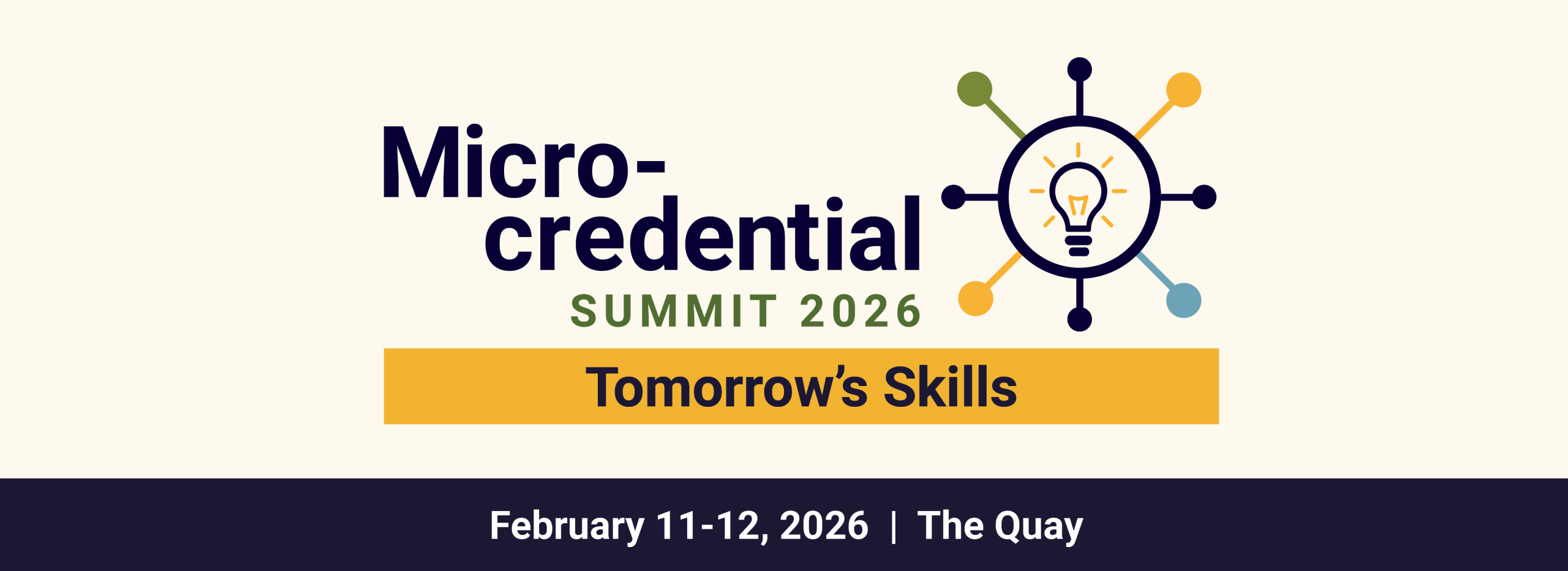Equip your learners with the digital skills they need to succeed
Academic success now demands that learners be digitally proficient. We call this Digital Fluency — having the skills to use digital tools and technologies to learn, explore, and create.
eCampusOntario’s new Digital Fluency Accelerator Micro-credential is specifically designed to be delivered by educators helping learners attain the skills they need to succeed academically.
Now Available: Digital Fluency Accelerator Micro-credential results report.
The Digital Fluency Micro-credential is bilingual, asynchronous and suitable for online and hybrid learners attending publicly-assisted colleges, universities and Indigenous Institutes. Consisting of five modules, the program enables learners to acquire digital fluency skills.
Learners will explore digital tools and technologies and gain the necessary sustainable and transferable skills required for effective online learning, such as managing digital files, digital design creation, safe digital communication, and digital navigation.
eCampusOntario’s delivery model is based on the collaboration and participation of educators who understand the enormous value of digital fluency to learners.
Below, you can explore the insights of the education leaders who implemented the Digital Fluency Accelerator Micro-credential at their institutions. These educators share their reflections on the importance of digital fluency skills, their accomplishments with the program, or the benefits their institutions have experienced from their participation. To equip your learners with the digital fluency skills they need to succeed, please see the Open Library to download your package today.
Humber College Institute of Technology & Advanced Learning
First Name: Berta
Last Name: Hancock
Role/Title: Open Education Resource Coordinator
“I aim to help students enhance their portfolios by adding skills and micro-credentials that will prepare them for the digital learning landscape. I also find joy in solving problems that arise when launching this micro-credential in our LMS, which helps me grow my own digital flexibility and currency. I look forward to adopting this micro-credential in future semesters.”
York University
First Name: André
Last Name: Williams
Role/Title: Manager, Programs & Development
“I am particularly proud of the enthusiastic support we’ve received from both faculty members and students in this initiative. This reflects the increasing demand for digital fluency skills, both within academia and in broader contexts. As a stronger advocated for lifelong learning, this project has provided participating faculties with valuable insights into the practical aspects of micro-credentials – what they look like in action, how they operate, and the level of support they receive. Notably, there has been a keen interest, among faculty members in exploring innovative ways to incentivize these micro-credentials. This exploration has significantly influenced how they conceptualize, and subsequently, implement the functioning of micro-credentials to generate benefits that extend beyond the specific program they are associated with. In essence, this initiative has become a crucial steppingstone in advancing the conversation and work on micro-credentials within the York University community.”
Conestoga College
First Name: Awadhesh
Last Name: Kumar
Role/Title: Professor
“I’m here to assist and provide guidance to the best of my ability. However, I take pride in helping users learn, grow, and find solutions to their queries. It’s fulfilling when I can offer explanations that clarify complex concepts or provide advice that aids in decision-making. Seeing users gain confidence or understanding through our interactions is what brings me the most satisfaction.”
Sheridan College
First Name: Dalia
Last Name: Hanna
Role/Title: Associate Dean
“I’m very proud that I represent my institution in establishing this training. I connected with many stakeholders in the institution like the Library, Centre for Teaching and Learning, Student Support, Learning Success and Learn Well Teams. Engaged students who serve as learn-well facilitators to design marketing materials within the institution and disseminate these materials with our D2L virtual communities. Further, I’m excited about faculty buy-in and their dedication to participating in this initiative and promoting it to their students in the selected courses. Finally, I presented the initiative through our associate dean council to raise awareness of the training and get support to engage students with the training.”
Kenjgewin Teg
First Name: Emily
Last Name: Deegan
Role/Title: Academic Technologist
“I am proud of being instrumental in providing our students with the opportunity to develop their digital fluency skills.”
Ontario Tech University
First Name: Lasandra
Last Name: Conliffe
Role/Title: Educational Technology Analyst
“As a digital fluency coach, I’ve found significant benefits in supporting learners through micro-credential programs. The critical nature of these opportunities is underscored by the need for widespread availability across our campus, ensuring all learners can enhance their digital skills. Extending such opportunities beyond the classroom is essential, offering them to administrative staff who share a passion for education and technology. This experience has allowed me to engage with learners in my coaching role and as an educator, advocating for the mandatory integration of digital fluency skills. Collaborating with like-minded learners, educators, and coaches, I’ve contributed to advancing micro-credentials and fostering a broader learning community. This inclusive approach recognizes the importance of digital fluency within academic settings and administrative roles, promoting a holistic and integrated approach to technology-enhanced learning.”
St. Lawrence College
First Name: Michael
Last Name: Carter
Role/Title: Professor
“I’m proud of my students for embarking on a self-guided learning journey through this micro-credential. I feel blessed to be in a position where I can support my students and help them fill in the gaps in their digital literacy. I am looking forward to sharing the success of my students with fellow faculty members so they can offer this opportunity to their students as well.“



